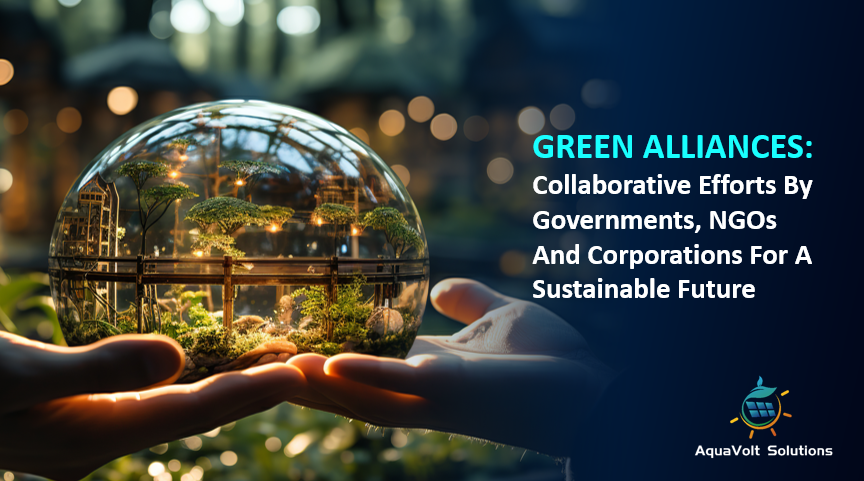
As the world grapples with the escalating impacts of climate change, the need for collective action has never been more urgent. Governments, non-governmental organizations (NGOs), and large corporations are increasingly recognizing the importance of collaboration to address environmental challenges and promote sustainable practices. This blog post explores the various initiatives and partnerships that highlight the power of green alliances in shaping a sustainable future.
Understanding the Role of Governments, NGOs, and Corporations
Governments play a crucial role in establishing policies, regulations, and funding mechanisms that can drive large-scale environmental initiatives. NGOs often act as catalysts for change by advocating for sustainable practices, raising public awareness, and implementing grassroots programs. Meanwhile, large corporations can leverage their resources and expertise to scale up sustainable innovations. Together, these entities can create a powerful force for environmental change.
Key Collaborative Initiatives
- The Paris Agreement: One of the most significant global commitments to combat climate change, the Paris Agreement, involves collaboration among governments, NGOs, and various stakeholders, including corporations. This landmark accord aims to limit global warming to well below 2 degrees Celsius, with nations committing to reduce greenhouse gas emissions. NGOs play a vital role in holding governments accountable, providing technical expertise, and mobilizing community support, while corporations are increasingly aligning their strategies with these global goals.
- The United Nations Sustainable Development Goals (SDGs): Adopted by all UN member states, the SDGs include goals related to clean water, affordable and clean energy, climate action, and sustainable cities. Governments, NGOs, and corporations work together to implement programs aligned with these goals, promoting sustainability at local, national, and global levels. Initiatives range from renewable energy projects to sustainable agricultural practices, showcasing the potential of collaborative efforts.
- The Global Environment Facility (GEF): The GEF is a partnership between 183 countries, international institutions, NGOs, and private sector actors dedicated to addressing environmental issues while promoting sustainable development. Through funding and support, the GEF helps countries implement projects related to biodiversity, climate change, and land degradation. This collaborative approach ensures that diverse perspectives are considered, leading to more effective solutions.
- Corporate Partnerships for Ecosystem Restoration: Many corporations are joining forces with NGOs to restore degraded ecosystems and promote biodiversity. Projects like the Bonn Challenge aim to restore 150 million hectares of deforested and degraded land. Corporations such as Unilever and Coca-Cola have partnered with NGOs to enhance sustainable sourcing practices and invest in reforestation efforts, proving that private-sector engagement is vital for achieving global sustainability goals.
- Clean Energy Initiatives: Transitioning to renewable energy sources is crucial for achieving a sustainable future. Governments are partnering with corporations to promote clean energy initiatives, such as solar and wind projects, particularly in underserved communities. For example, companies like Google and Amazon have committed to powering their operations with 100% renewable energy and are collaborating with governments to expand clean energy access worldwide.
The Importance of Local Engagement
While global initiatives are essential, local engagement is equally critical for success. NGOs often have deep-rooted connections within communities, allowing them to tailor solutions that meet specific needs. Collaborative efforts can empower local populations, fostering a sense of ownership and responsibility toward sustainable practices.
Challenges and Opportunities
Despite the potential for impactful collaborations, challenges remain. Funding constraints, bureaucratic hurdles, and differing priorities can hinder progress. However, these obstacles also present opportunities for innovation and creativity. By working together, governments, NGOs, and corporations can identify solutions that maximize resources and achieve shared goals.
The Path Forward

As we move toward a more sustainable future, the importance of green alliances cannot be overstated. Collaborative efforts among governments, NGOs, and corporations are paving the way for innovative solutions to environmental challenges. By leveraging their respective strengths, these entities can create a more sustainable world for future generations.
In conclusion, the fight against climate change and environmental degradation requires a unified approach. Governments, NGOs, and corporations must continue to work together, building on their successes and addressing challenges collaboratively. Through green alliances, we can empower communities, protect our planet, and ensure a sustainable future for all.
#AquavoltSolutions #AVS #AVSBLOG #RenewableEnergy #ShapeTheFuture #GreenTech #CleanWorld #CleanEnergy #GreenTomorrow #SmartWorld #GreenWorld #Initiatives #CarbonFootprint #BusinessStrategy #SustainableFuture #Revolution #Innovation #GreenAlliances #Government #NGOs #Corporations #Unilever #CocaCola #Google #Amazon #CollectiveMovement #JoinTheMovement

